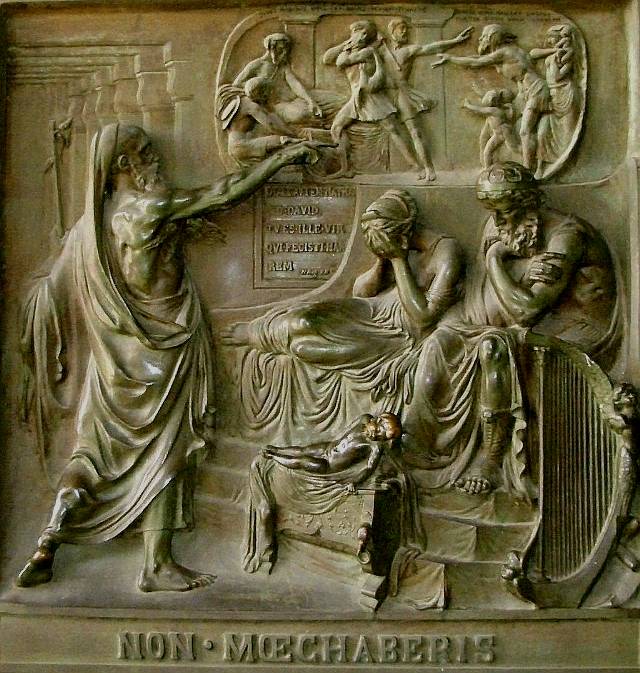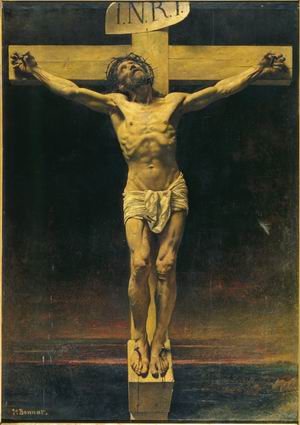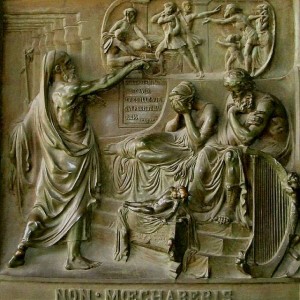 |
| Baron Henri de Triqueti, Non Mechaberis (Nathan Confronts David) (1837) |
A reader emailed me a question about the distinction between the temporal and eternal consequences due to sin In a nutshell, the Catholic view is that sin incurs eternal damnation, and that Jesus Christ takes this consequence away for believers through His Death on the Cross, but that Christ didn’t (and didn’t intend to) remove every consequence of sin. In fact, as you’ll see below, it’s precisely because of Christ’s Death on the Cross that Purgatory exists.
The discussion was related to 2 Samuel 12:13-14. David’s affair with a married woman (who he then impregnates) leads him to engineer the death of her husband in battle. The prophet Nathan confronts him about it, and David repents. Nathan then says, “The LORD also has put away your sin; you shall not die. Nevertheless, because by this deed you have utterly scorned the LORD, the child that is born to you shall die.” That’s a rather clear distinction between eternal consequences (eternal death) and temporal consequences (the loss of his son). The reader suggested that this might be different today, since David lived and died before the time of Christ. I don’t think so. Here’s why:
- I assume the reader believes that David was saved from the fires of Hell. If that’s the case, I assume the reader also believes that this is because Jesus Christ’s merits on Calvary can be applied to anyone at any point in the past, present, or future, since it’s an eternal Sacrifice. That is, Christ’s Death saved the B.C. and A.D. elect, if you will. If all that’s true, then Christ’s Sacrifice applies to all of the saved, under both the Old and New Covenant. But if all that’s true, why would David be punished worse than someone today? He’s just as much saved by Christ’s merits as a believer today.
- Maybe a better way of asking it would be this: did David’s punishment take away the need for Christ’s Sacrifice? Hopefully, we can all say “no” without a moment’s hesitation. David wasn’t saved apart from Christ – nobody was. But if David’s punishment doesn’t diminish the need for Christ’s Sacrifice, why would Christ’s Sacrifice eliminate the necessity of David’s punishment?
- To distinguish between the temporal and eternal consequences of sin, imagine that you steal a car. You regret doing this, and ask forgiveness, and are forgiven. But you might still have to (a) return the car, (b) provide some sort of reparation to the car owner, and (c) be punished by the State. Each of those is a temporal consequence or punishment quite distinct from your soul spending eternity in Heaven or Hell.
- St. Paul talks about the role that the State plays in this regard, serving as “God’s servants, agents of wrath to bring punishment on the wrongdoer” (Romans 13:4). Obviously, the State doesn’t damn or save people, so Paul is clearly describing temporal punishments for sin.
- The Book of Hebrews also describes God as providing temporal punishments to sinners precisely to avoid the need for Hell: “He disciplines us for our good, that we may share His holiness. For the moment, all discipline seems painful rather than pleasant; later it yields the peaceful fruit of righteousness to those who have been trained by it.” (Hebrews 12:10-11).
 |
| Léon Bonnat, Crucifixion (1880) |
 |
| Bernardino Mei, Christ Cleansing the Temple (1665) |

Hi Joe,just for clarity, lets say I’m punished for all my sins here on earth, by your logic are you saying I would not need pass through Purgatory because I’ve already been punished.
Thanks
The main problem here is that Protestants believe in Sola Fide, which hinges upon the equally important Penal Substitution. That’s the root of the problem.
When Protestants hear a Catholic say “temporal punishment,” they really hear “Christ’s substitutionary punishment was insufficient”. In reality, Christ didn’t take the punishments we deserved. So the real problem is a totally incorrect understanding of the Cross. Unless that is corrected first, then the Protestant will be totally blinded in understanding purgatory.
This is why Protestants totally botch Isaiah 53, and some (e.g. NIV) even insert the word “punishment” in Isaiah 53:5 rather than the true word. As I explained in my Penal Substitution Debate against a Calvinist:
===============
One text which (unfortunately) received less interaction that I expected was Isaiah 53. Verse 5 is especially significant in that it uses a conspicuous word, “chastise,” rather than an expected term like “punish,” which is the exact opposite of what we would expect for a Penal Substitution text. Proverbs 3:11-12 uses the same Hebrew word for “chastise,” which is a passage quoted in Hebrews 12:6,10 and applied to Christians. There is an important distinction between the concept of chastisement and punishment, and the Reformed tradition has always (rightly) recognized it. The words of John Calvin state it succinctly:
For the sake of distinction, we may call the one kind of judgment punishment, the other chastisement. In judicial punishment, God is to be understood as taking vengeance on his enemies, by displaying his anger against them, confounding, scattering, and annihilating them. By divine punishment, properly so called, let us then understand punishment accompanied with indignation. In judicial chastisement, he is offended, but not in wrath; he does not punish by destroying or striking down as with a thunderbolt. Hence it is not properly punishment or vengeance, but correction and admonition. The one is the act of a judge, the other of a father.
…To have a short and clear view of the whole matter, we must make two distinctions. First, whenever the infliction is designed to avenge, then the curse and wrath of God displays itself. This is never the case with believers. On the contrary, the chastening of God carries his blessing with it, and is an evidence of love, as Scripture teaches [footnote 370: Job 5:17; Prov. 3:11; Heb. 12:5].(Institutes Bk3:Ch4:Sec31,32)
So, rather than Christ receiving divine punishment while Christians receive chastening – which is what Penal Substitution requires – Scripture actually applies the same concept to both. And Scripture brings out this point even more clearly:
Hebrews 5: 7During the days of Jesus’ life on earth, he offered up prayers and petitions with loud cries and tears to the one who could save him from death, and he was heard because of his reverent submission. 8Although he was a son, he learned obedience from what he suffered 9and, once made perfect, he became the source of eternal salvation for all who obey him
This is precisely how Isaiah 53:5 is to be understood when it says: “The chastisement for our peace was upon Him, And by His stripes we are healed.” The Protestant scheme simply cannot do justice (no pun intended) to what Scripture has to teach about the nature of Christ’s sufferings.
Is it just me, or is there no longer a way to subscribe to comments?
I’m still seeing a box asking to send follow-up comments. Anybody else having problems with this?
WRA,
You are correct. It’s possible that someone’s spiritual purgation will occur completely on this earth — that they’ll be sufficiently disciplined to the point that they don’t have any need for further preparations before enjoying eternity in sinless Heaven. One of the Saints (I think St. Thomas Aquinas, but can’t recall) suggested that this might be what happens during the Great Tribulation at the end of time: Purgatory on Earth.
I.X.,
Joe
You’ve thoroughly demonstrated the distinction between temporal and eternal consequences due to sin in *this* life, but how would you go about showing that this still has to play out after death?
(and I’m not seeing the comment subscription any more)
(I’ve just subscribed my Blog Reader to the *comments* RSS feed:
http://catholicdefense.blogspot.com/feeds/comments/default?orderby=published
Restless Pilgrim,
My goal was less to show that Purgatory was necessary, and more to debunk what is the most common argument against it (that Purgatory is antithetical to Christ’s Atonement). Purgatory, if true, flows rather naturally from the Atonement. And, of course, as WRA noted above, the process of purgation begins here on Earth. It’s just the flip side to sanctification. That doesn’t prove Purgatory, per se, but it does begin to dismantle the case against Purgatory.
But let me go ahead and tackle the question you raise. We’re now looking at a much narrower question; in short, does the process of purgation from our sins continue after death for some individuals, to prepare their souls to enter perfection in Heaven?
And here, I think that the necessity for Purgatory is fairly obvious. Plenty of believers die in a state of grace, but with souls unprepared to spend eternity before God (see Revelation 21:27), due to attachment to venial sin. 1 John 5:16-17 describes such sins as not leading to death, but still needing our prayers. And in 2 Maccabees 12:43-46, we see that the ancient Israelites prayed for the dead, for precisely this reason. In fact, that passage ends by telling us that it is “a holy and wholesome thought to pray for the dead, that they may be loosed from sins.”
As St. Thomas Aquinas points out in the Summa, this makes sense only if some of the dead are in Purgatory, since “there is no need to pray for the dead who are in heaven, for they are in no need; nor again for those who are in hell, because they cannot be loosed from sins.”
Even Protestants who reject the canonicity of 1 and 2 Maccabees should recognize their historicity. As I’ve mentioned before, Christ celebrated Channukah, which is prescribed in these Books (and in no Books of the Protestant Old Testament). If Judas Maccabeus was a heretic for praying for the dead, it’s weird that Christ celebrated a holiday he was at the center of.
There’s more that can be said (Jesus seems to assume a belief in Purgatory in Matthew 12:32, Paul seems to describe Purgatory in 1 Cor. 3:11-15, etc.), but suffice to say that there’s a very sound case, both logically and Scripturally, for Purgatory. That’s not to say that Purgatory is necessary in a strict sense (after all, some souls don’t need to go through purgatory, due to their sanctity; so it’s only our own sinfulness that makes it necessary). But I would add this: to reject Purgatory, you are virtually required to reject prayers for the dead, the distinction between mortal and venial sin, and the reality that we cannot stand in the New Jerusalem with even a spot of stain on our souls. But all of these things are transparently self-evident in Scripture.
I.X.,
Joe
P.S. My comment window just updated today to the new format. I finally see what y’all are talking about.
Ah, it was that last paragraph that really helped – I had never thought about it that way – take away Purgatory and see what other things fall away as well. Good stuff.
How about this hypothesis:
In the BC “economy of salvation”, there was no purgatory because Christ merits didn’t establish it yet.
Abraham’s bossom implied no suffering except the lack of beatific vision.
If there was no purgatory, then you had to suffer the temporal penalty for sin on earth: this is the famous inter-generational curse of sin (David’s son dying for his parent’s sin), leprosy, etc. The lack of purgatory meant that people would not survive if continuing to sin (that’s why there were harsh measures to avoid the spread of sin such as stoning adultery or sodomy).
Now after Resurrection, you could pay in purgatory as well. So there is no need to stone grave sinners.
The fact that the end times are purgatory on earth, make a lot of sense, considering purgatory must be empty by the time Jesus comes and therefore it shouldn’t receive more souls.
Please send your comments to:
f.nazar at gmail.com